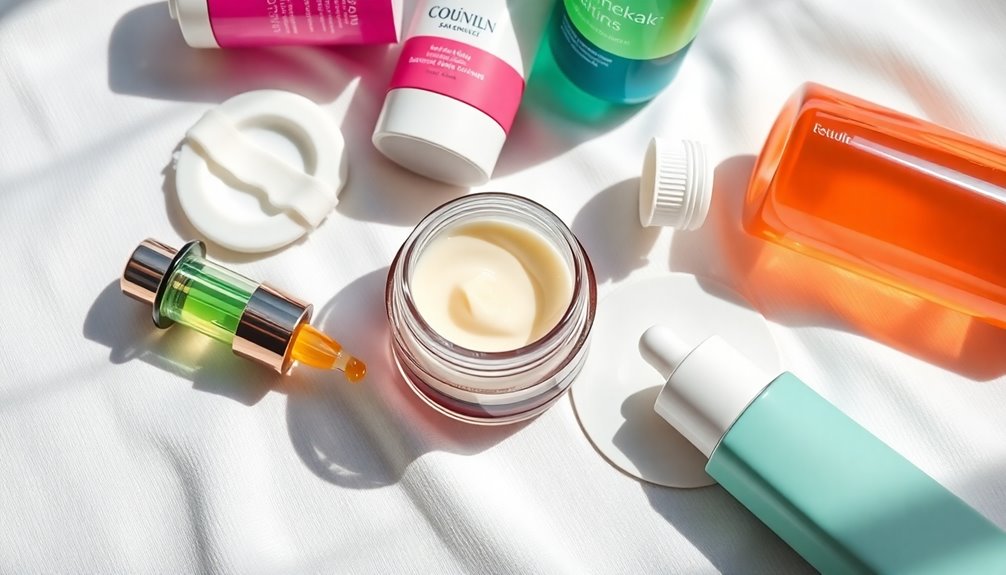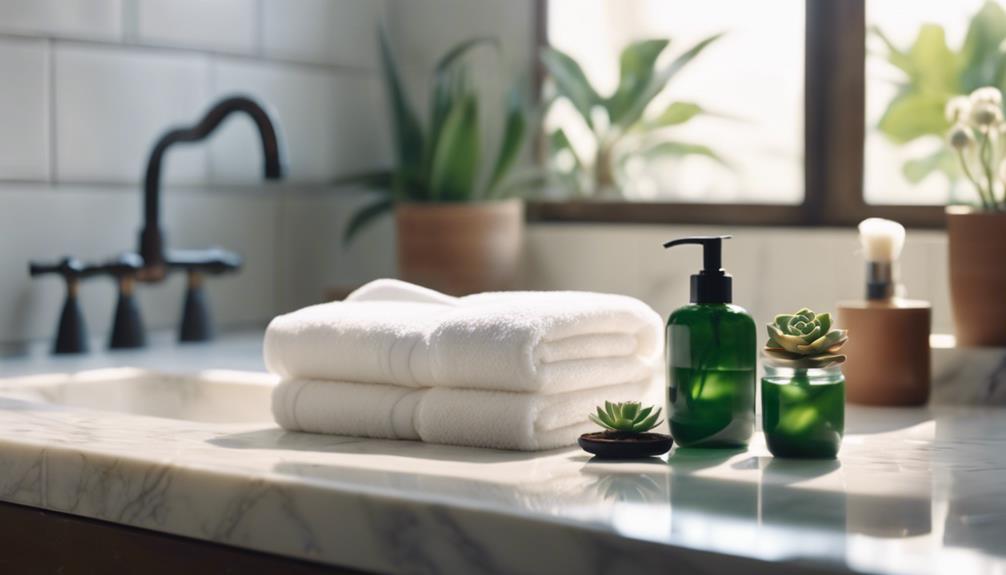To avoid disrupting your skin's pH, steer clear of common mistakes. Don't wash your face with hot water or harsh bar soaps; use lukewarm water and a gentle cleanser instead. Remember to remove all makeup before bed—makeup remover wipes aren't enough. Over-exfoliating can weaken your skin barrier, so limit exfoliation to two or three times a week. Always apply sunscreen daily to protect against UV damage. Finally, pick the right products for your skin type to prevent irritation. Curious about more tips? There's a lot more to learn that could help transform your skincare routine!
Key Takeaways
- Not using pH-balanced cleansers can disrupt skin's natural barrier, leading to irritation and dryness.
- Over-exfoliating can weaken the skin barrier, causing increased sensitivity and chronic dryness.
- Using alkaline products with a pH above 7 compromises skin health and increases water loss.
- Incorrect product selection based on skin type can lead to irritation or exacerbate existing conditions.
- Skipping sunscreen exposes skin to harmful UV rays, resulting in premature aging and increased cancer risk.
Not Washing Your Face Properly
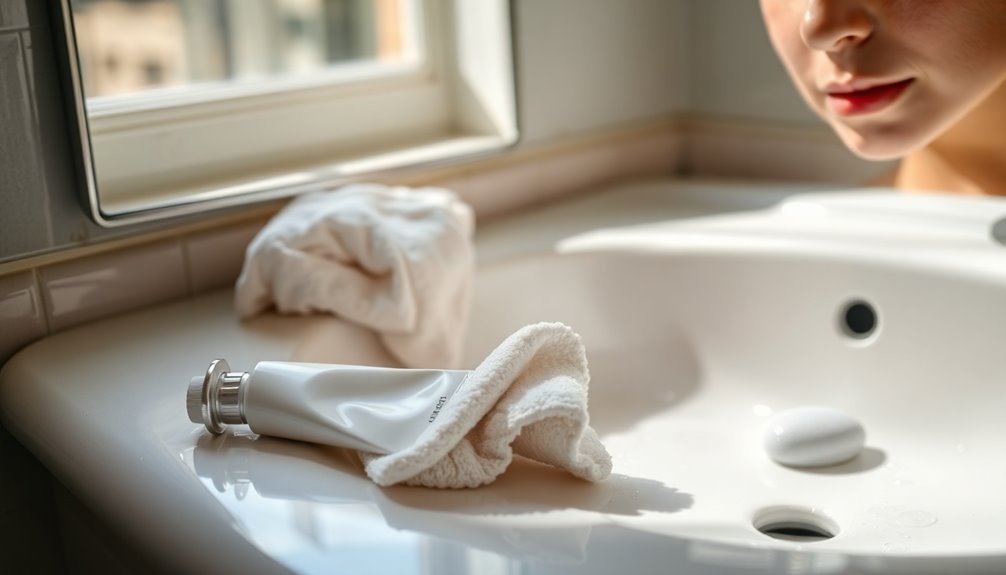
Not Washing Your Face Properly
One of the biggest skincare blunders you can make isn't washing your face properly. Using water that's too hot can strip your skin of its natural oils, leading to irritation. Instead, stick to lukewarm water to help maintain your skin's pH balance. Cold water mightn't cut through dirt and grime effectively, so find that sweet spot. Additionally, using a cleanser with HEPA filters can help reduce exposure to airborne allergens that might irritate your skin.
When it comes to cleansing, avoid harsh bar soaps that alter your skin's pH. Use your fingertips to gently massage the cleanser into your skin, as they're more effective and less abrasive. If you choose to use a washcloth, ensure it's clean to avoid bacteria buildup. Double cleansing is crucial for thoroughly removing makeup and dirt before you start your cleansing routine.
Soft, natural sponges like konjac sponges can be a great alternative for gentle exfoliation.
Before you wash your face, don't forget to remove your makeup. A gentle makeup remover is essential, especially for sensitive areas like your eyes. Double cleansing is key to getting rid of both makeup and dirt.
Over-Exfoliating
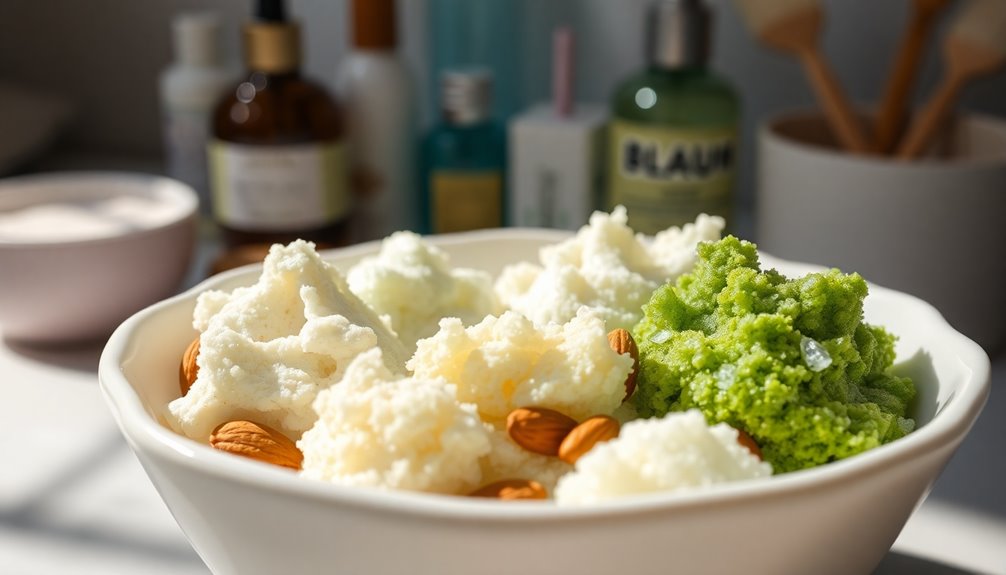
While proper cleansing sets the foundation for healthy skin, over-exfoliating can quickly undo your efforts. If you notice redness, irritation, or dry, flaky patches, you might be pushing your skin too hard. Increased sensitivity to products and environmental factors can follow, making your skin more reactive than ever. You may even experience breakouts, as a weakened skin barrier struggles to defend itself.
Over-exfoliation damages this protective barrier, leading to chronic dryness and accelerated aging by breaking down collagen and elastin. You might also see uneven skin tone or hyperpigmentation, which can be frustrating. Excessive exfoliation can compromise skin health and lead to adverse effects, making it essential to find the right balance.
For oily skin, exfoliating 2-3 times a week is manageable, but excessive scrubbing can increase oil production. Dry skin, on the other hand, only needs gentle exfoliation once or twice weekly.
If you suspect over-exfoliation, stop immediately. Allow your skin to heal by using mild, hydrating moisturizers and fragrance-free cleansers. Avoid harsh products or irritants until your skin recovers.
Once it feels better, you can gradually reintroduce exfoliation, starting slowly to find the right balance for your skin type.
Skipping Sunscreen
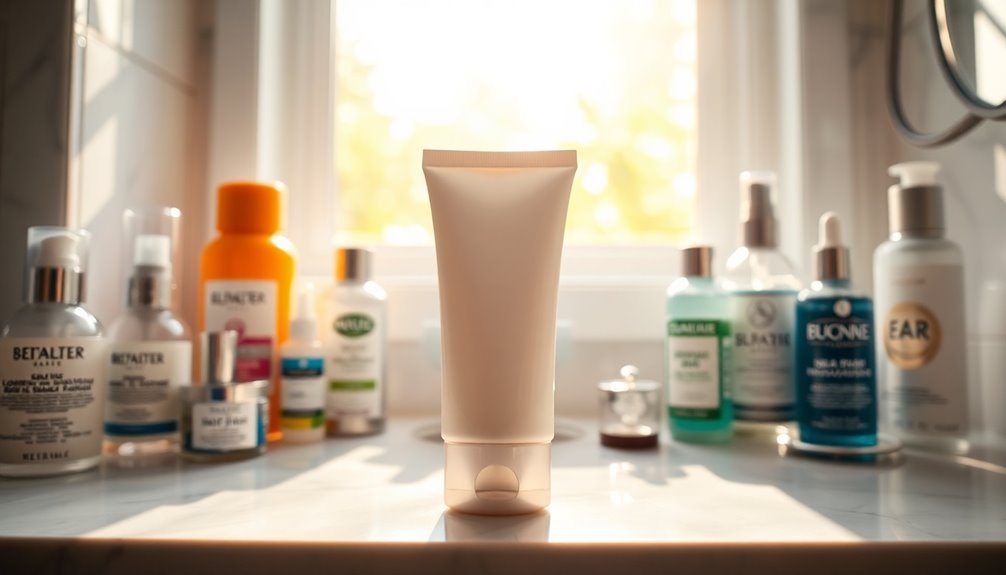
Skipping sunscreen is like leaving your skin unprotected in a battle against harmful UV rays. Prolonged UV exposure breaks down collagen and elastin fibers, leading to premature wrinkles and fine lines.
UVA rays penetrate deeply, causing discoloration and deep-set wrinkles that can make you look older than you are. Without daily sunscreen, your skin ages faster, losing elasticity and radiance, leaving you with a dull appearance. Additionally, regular application of sunscreen helps in maintaining skin health by preventing further damage.
Moreover, UV radiation is a significant factor in skin cancer, including melanoma and basal cell carcinoma. Having more than five sunburns can double your risk of developing skin cancer.
Every time you skip sunscreen, you increase DNA damage in your skin cells, which can result in genetic mutations that lead to severe health issues.
Sunburns are another consequence of neglecting protection from UVB rays, leading to fiery-red skin and long-term damage.
Don't forget that sun exposure can trigger uneven melanin production, creating dark spots and hyperpigmentation.
Applying broad-spectrum SPF 30 or higher daily is crucial not just for preventing sunburn but for maintaining an even skin tone and protecting your overall skin health.
Touching and Picking the Skin

Touching and picking at your skin can lead to a cascade of immediate and long-term consequences that can severely impact your skin health.
In the short term, you might notice increased inflammation, redness, and irritation, worsening existing skin conditions. Picking can create open wounds, making your skin more vulnerable to bacteria, which can exacerbate breakouts and lead to infections like cellulitis. These issues can prolong healing times and increase the risk of scarring. Additionally, open wounds from picking create entry points for bacteria, heightening the risk of infections. It is crucial to note that repeated skin damage can also diminish the effectiveness of your skin's natural sun protection.
Over time, these habits can have lasting effects. You'll face permanent scarring and hyperpigmentation due to disrupted healing and damaged tissues. Your skin barrier weakens, making it more susceptible to further damage. This can result in uneven skin tone, as melanin activity increases, causing dark or hypopigmented scars.
To prevent these consequences, consider using hydrocolloid patches for a moist healing environment or applying Vaseline to promote quicker recovery.
Keeping your nails short and wearing cotton gloves at night can also help curb the urge to pick. Finally, find distractions, like twisty toys, to keep your hands busy and avoid falling into this detrimental habit.
Using Incorrect or Harsh Products
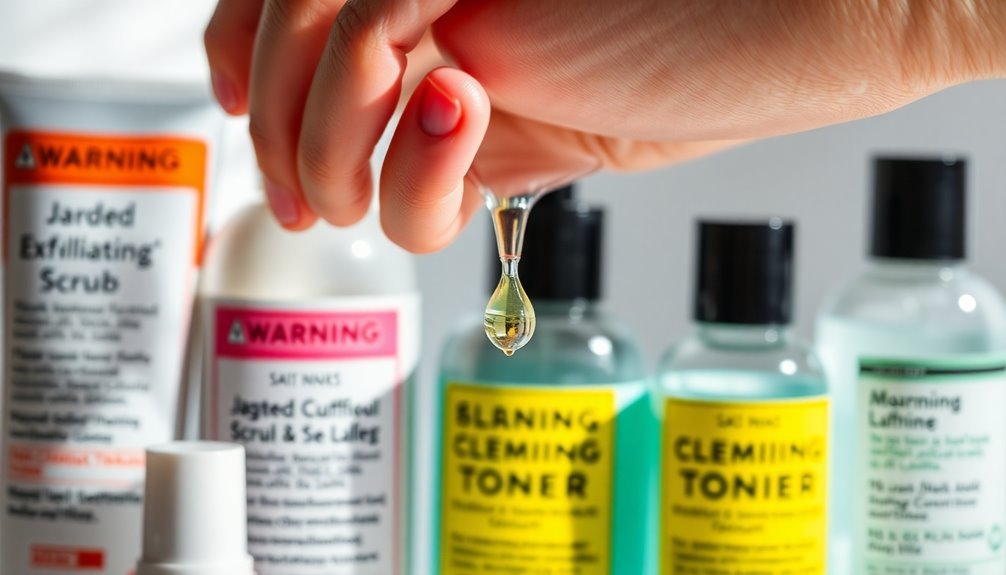
Choosing the wrong skincare products can wreak havoc on your skin, leading to irritation, dryness, and long-term damage. Alkaline products, such as traditional soap-based cleansers, can disrupt your skin's natural pH, increasing its susceptibility to irritation and external stressors. An important study found that using products with an alkaline pH can cause significant transepidermal water loss and impair the skin barrier.
If you’re using products with a pH above 7, you’re stripping your skin of natural oils, compromising your skin barrier, and risking increased transepidermal water loss. The use of alkaline products can lead to dryness, irritation, and sensitivity over time. To maintain a healthy complexion, prioritizing products that respect your skin’s natural pH is essential. For those looking to restore balance, natural pH balancers explained can offer valuable insights into how to nurture your skin effectively while preserving its protective barrier.
It's vital to consider your skin type when selecting products. For sensitive or dry skin, aim for products with a pH close to your skin's natural range (4.5-5.5). Oily or acne-prone skin benefits from slightly more acidic products, while aging skin requires a balance to maintain moisture. Ignoring these factors can lead to unbalanced skin pH and issues like dryness and irritation.
Also, take a closer look at product ingredients. Harsh cleansers with high pH can disrupt your skin's acid mantle.
Always choose cleansers with a pH between 4.0-5.0 and ensure that toners and moisturizers align with your skin's natural pH to reinforce hydration and barrier function. Your skin will thank you for it!
Neglecting Basic Skincare Practices
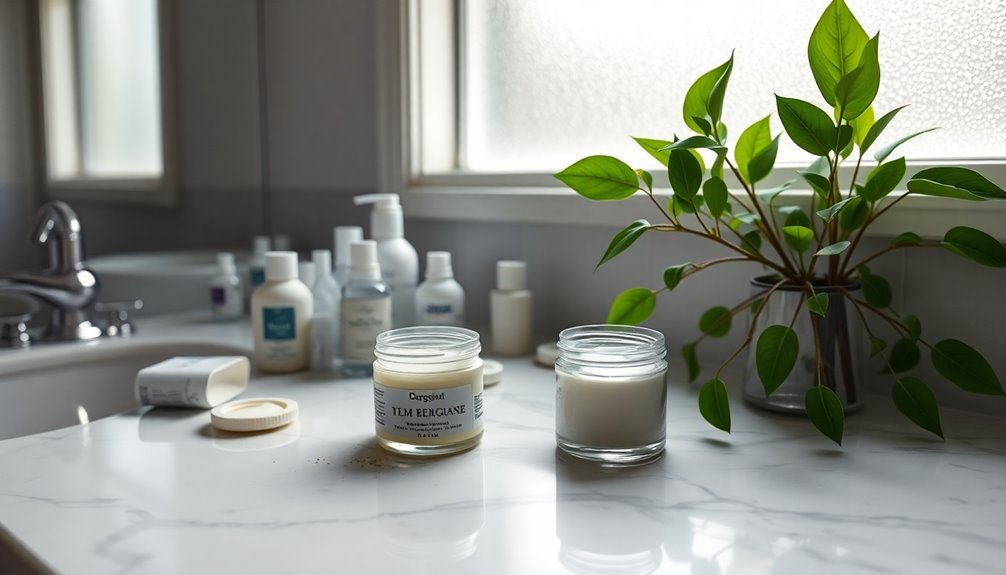
Many people underestimate the importance of a consistent skincare routine, but neglecting basic practices can seriously impact your skin's health. Skipping core steps like cleansing, toning, and treatment can leave your skin vulnerable. If you use a few products sporadically instead of sticking to a regular routine, you're likely hindering their effectiveness.
One of the biggest mistakes isn't washing your face before bed, especially if you wear makeup. This can lead to clogged pores and skin damage. Using makeup remover wipes as a substitute for proper cleansing isn't enough; dirt and oil accumulate, causing breakouts. Additionally, not removing makeup before bed disrupts skin repair cycles, which can exacerbate these issues. It's important to remember that poor oral health can also manifest in skin problems due to the body's inflammatory response.
Additionally, don't forget about sun protection. Skipping daily sunscreen can result in sun damage and increase your risk of skin cancer. Make sure to apply it, rain or shine, and reapply throughout the day.
Ignoring Skin Type Needs
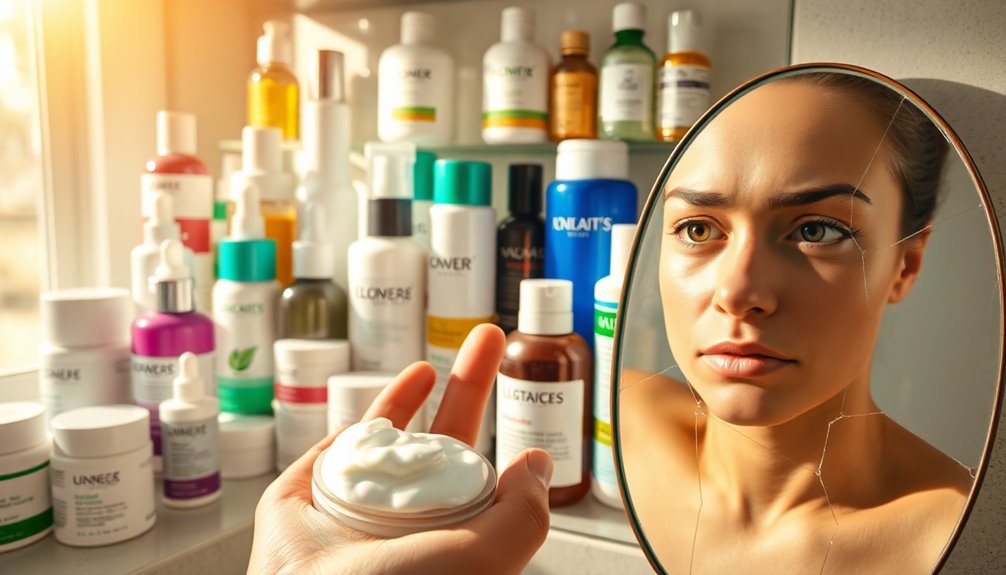
When it comes to skincare, understanding your skin type is crucial for achieving healthy, radiant skin. Ignoring your skin's unique needs can lead to a host of problems. For instance, using harsh cleansers on combination or dry skin strips away essential oils, resulting in dryness and irritation.
If you're treating oily areas without adjusting for the drier parts of your face, you could exacerbate the dryness elsewhere. Additionally, heavy moisturizers can clog pores if you have acne-prone skin, while chemical exfoliators might damage your skin barrier if used on dry skin. Keeping in mind that gentle, sulfate-free cleansers are recommended for combination skin can help prevent over-drying. Regular skin treatments, such as professional facials, can also address varying skin type needs effectively.
It's vital to customize your product application to target specific areas; don't apply the same products uniformly. Seasonal changes also demand adjustments in your routine. Using the same products year-round can lead to issues, whether that's increased oiliness in summer or dryness in winter.
Lastly, don't hesitate to consult a skincare professional for tailored advice. Following trends or influencer recommendations without considering your skin type could lead to ineffective results, so make sure you know what your skin truly needs.
Overusing Makeup Remover Wipes
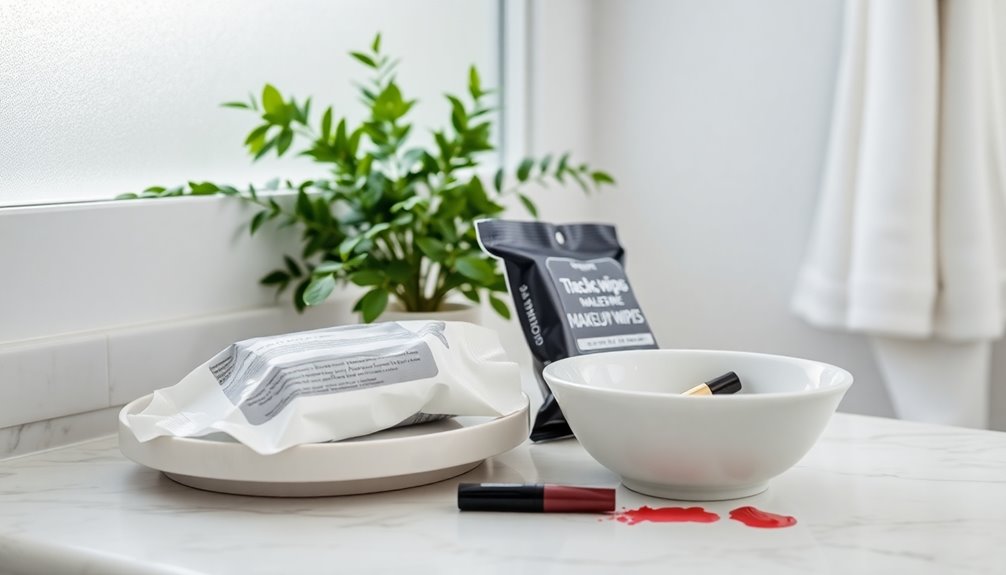
Overusing makeup remover wipes can lead to skin irritation and ineffective cleansing. These wipes often contain surfactants, preservatives, and fragrances that can irritate your skin, causing allergic reactions or dehydration. The rubbing action required to remove makeup can create micro-tears, advancing the aging process and disrupting your skin's protective acid mantle. Additionally, these wipes can destroy the acid mantle, which plays a crucial role in protecting your skin.
While convenient, makeup wipes aren't effective at thoroughly cleansing your skin. Instead of removing dirt and makeup, they tend to smear it around, leaving behind residues that can clog pores—especially problematic for oily or acne-prone skin. Without a rinsing step, grime remains on your face, contributing to breakouts.
Moreover, makeup wipes pose an environmental challenge. Made from non-biodegradable materials, they take up to 100 years to decompose, adding to landfill waste.
For better results, consider alternatives like double cleansing with an oil cleanser followed by a traditional one. Reusable bamboo pads or washcloths serve as eco-friendly substitutes, while cleansing balms effectively remove makeup without harshness.
If you must use wipes, pair them with proper cleansing whenever possible to maintain your skin's health and the environment's well-being.
Misapplying Skincare Products
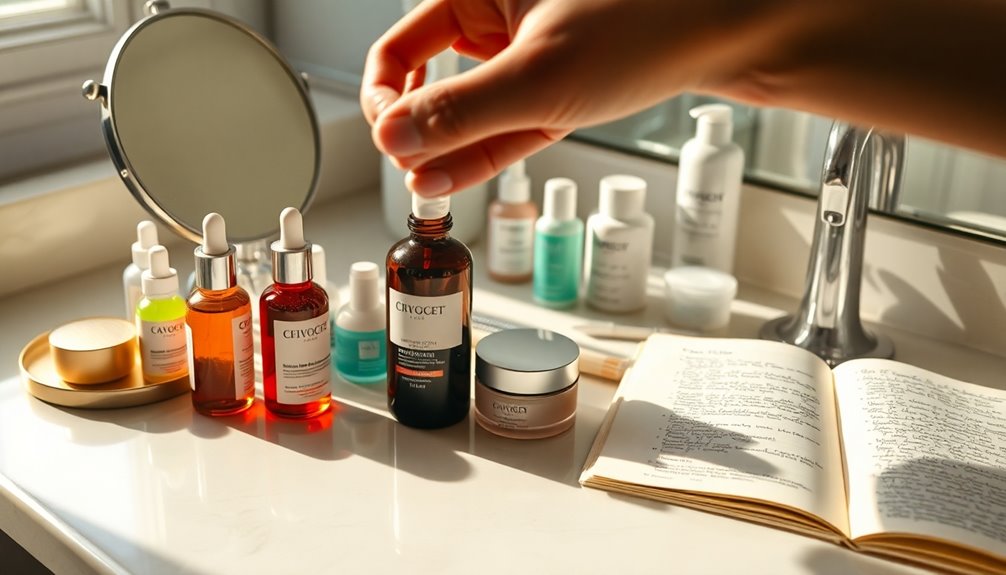
Misapplying skincare products can sabotage your efforts to achieve healthy skin. First, always apply your products in the correct order. Start with serums, followed by eye cream, and finally, face cream. Thinner products have higher concentrations of active ingredients, so they need to be layered first. Sunscreen should be the last step in your routine, as it protects the surface of your skin.
Inconsistency can also undermine your skincare regimen. Skipping steps like cleansing and toning disrupts your routine and limits effectiveness. Stick to a multi-step plan, and incorporate serums regularly to target specific concerns. Consistency in routine promotes better skin health and results.
Don't forget about areas like your neck and décolletage; they need the same care as your face. Applying products below the jawline and to your hands helps maintain youthful skin everywhere.
Lastly, using the wrong products for your skin type can lead to irritation or dryness. Identify whether your skin is normal, oily, dry, or combination, and choose products that cater to those needs.
Frequently Asked Questions
How Often Should I Change My Pillowcase for Optimal Skin Health?
You should change your pillowcase at least once a week for optimal skin health. If you have acne-prone skin or pets, consider changing it every other night to reduce bacteria and irritation.
Can Diet Affect My Skin's Ph Balance?
Yes, your diet can affect your skin's pH balance. Consuming too many processed foods and sugars can lead to acidity, while a diet rich in greens and whole foods helps maintain a healthier, balanced pH.
What Ingredients Should I Avoid for Sensitive Skin?
For sensitive skin, avoid harsh cleansers, alkaline toners, and irritating ingredients like sulfates or fragrances. Opt for gentle, pH-balanced products that support your skin's barrier and reduce the risk of irritation and dryness.
How Do I Determine My Skin Type Accurately?
To determine your skin type accurately, wash your face, wait 30 minutes, then observe for shine or dryness. Alternatively, use blotting sheets to check oil absorption in the T-zone for a clearer assessment.
Are There Specific Skincare Routines for Different Seasons?
Yes, there are specific skincare routines for different seasons. You should adjust your products to tackle seasonal changes, focusing on hydration in winter, lightweight formulas in summer, and soothing ingredients during fall allergies.
Conclusion
To keep your skin healthy and balanced, steer clear of these common skincare mistakes. Make sure you wash your face properly, don't over-exfoliate, and always apply sunscreen. Avoid touching your skin, choose the right products for your type, and don't rely too much on makeup remover wipes. Remember to follow basic skincare practices and apply products correctly. By being mindful of these habits, you'll help maintain your skin's pH and achieve a radiant complexion.
